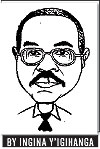In a message, a Kenyan friend reminded me of my ‘umugogo days’. The message was interesting not only because it reminded me of those days that I enjoyed so, but I also enjoyed the fact that we share the word ‘umugogo’ in our languages and all its implications. Of course, I was not getting in contact with a Kenyan language that is similar to Kinyarwanda for the first time, having lived in Kenya.


In a message, a Kenyan friend reminded me of my ‘umugogo days’. The message was interesting not only because it reminded me of those days that I enjoyed so, but I also enjoyed the fact that we share the word ‘umugogo’ in our languages and all its implications.
Of course, I was not getting in contact with a Kenyan language that is similar to Kinyarwanda for the first time, having lived in Kenya.
I remember a visiting Burundi team, known as Vital’O, playing with a Kenyan team, Gor Mahia, in Nairobi. We Rwandans, as neighbours to Burundi and speaking languages that are almost similar, found ourselves drawn to the side of Vital’O supporters in the stadium. In our cheering, you could tell the slight difference between Kirundi and Kinyarwanda, but we realised there was a third variation that was almost similar.
"Muteg’ukuguru!” was our common fans’ cry, which was an encouragement to a Vital’O palyer to tackle his Gor Mahia rival. While the expression is only different in pronunciation in Kirundi and Kinyarwanda, in the other variation ‘gu’ and ‘ku’ were fricative ‘ghu’ and ‘khu’ sounds. That is when we realised there were Baluhya amongst us, Vital’O supporters.
Baluhya, who are Kenyan, were supporting Vital’O from Burundi. But it didn’t exactly come as a surprise. In Kenya, some football teams belong to tribes and Gor Mahia belonged to the Dholuo tribe (no offence intended, Mr Phillip Ochieng!) and its biggest rival, Leopards, to the Luhya tribe. Therefore, it came naturally to Baluhya to support any team pitted against Gor Mahia.
What is important is that it shows how a creative mind can have many ways to unite many people. Unfortunately, there are destructive forces that are only interested in the power of division for selfish interests.
We know it in Rwanda: the tools that are at play to unite Rwandans are the same tools that were used to throw them into the abyss of 1994. Luckily, good always triumphs over evil, right over wrong, truth over falsehood….
That is how the simple mention of ‘umugogo’ can become an identification force for similar experiences. Similar experiences can be a basis upon which to build understanding among the different peoples of the world.
Mine, however, is not to preach but to narrate my adventures of yore!
‘Umugogo’ was a big log that we used as a bridge in D.R. Congo, in the early 1960s. As everything is gigantic there, you could find a wide gorge and in its middle, a wide river that flowed in torrents. Circling the gorge to go to the other side was impossible but, luckily, there were unbelievably big and high trees. They helped us cross. You only needed to fell one tree and you’d create a bridge as good as permanent and as long as one kilometre!
Of course, the bridges were not without their mishaps. Like this day we kids were playing hide and seek, hiding behind the back of one another, on such a bridge. Running round the back of a boy while another one pursued me, I slipped off the ‘mugogo’ and plunged down towards the monster of a river bellow.
For a moment I thought I was flying. Then I felt my foot hit something and stopped flying. When I opened my eyes, I could see the river still boiling down bellow but it was to my right now. Gingerly, I tried to twist my body to see exactly where I was, but something was holding me. Then I checked more carefully and felt it: a branch had cut into my ‘shirt’ and I was hanging from it, even as one foot rested on another branch.
‘Shirt’ in inverted commas because it was not your usual type of shirt. It was made to reach your shins, which made it look rather like a dress. Since we did not have shorts, the tailor made sure that the shirt was a ‘cover-all’. No one could laugh at us because everybody dressed that way.
But, anyway, how did I come out of my predicament? Fear had paralysed me, but now I regained my composure and weighed my chances. Being rescued was out because where I was hanging no one from the bridge could see me. For all they knew, I had sunk to my death. The only way out was to regain terra firma.
The tree I was hanging in was too dangerously near the point directly above the river, so I jumped from branch to branch towards our footpath. After all, few monkeys were better than I at that. So, I ‘jump-jumped’ until I was directly above the footpath that led from the bridge.
I kept jumping until I was directly above my party of travellers. Now I could even pick their conversation: "You think we shall ever see Ingina again?” From my good friend we called Nkunda. The sly fellow we called Inshabiranya: "Of course, we can’t be so lucky as to lose the scoundrel. A monkey has never died when it was in trees!”
At that point, I jumped down and joined them.


